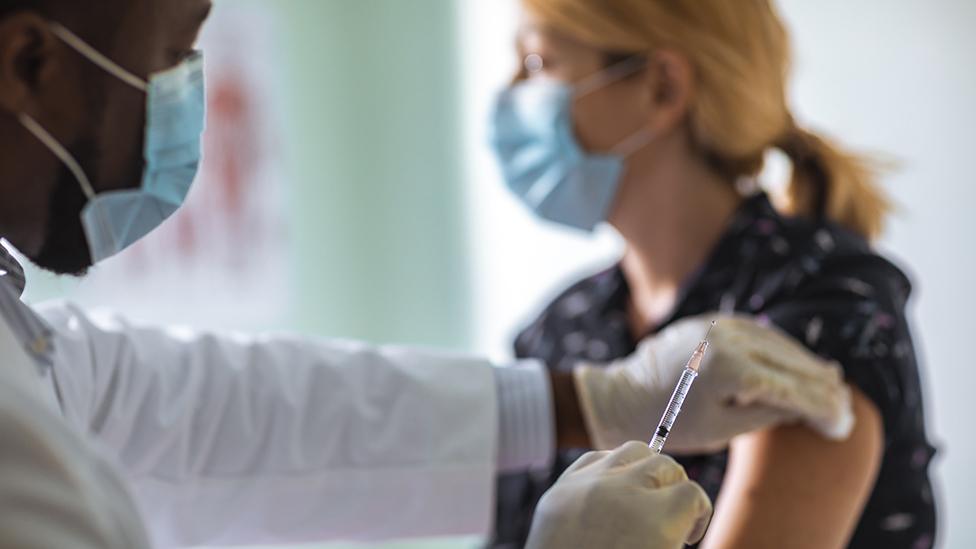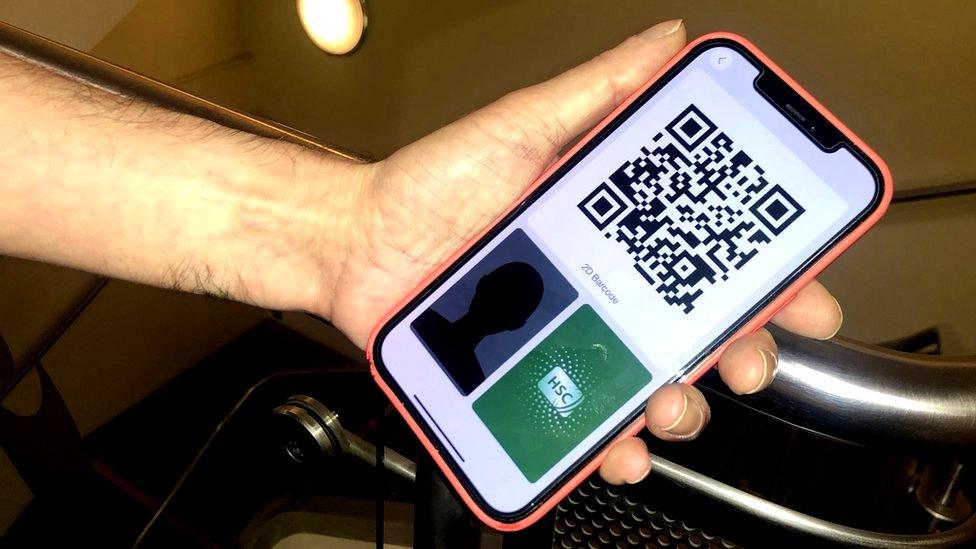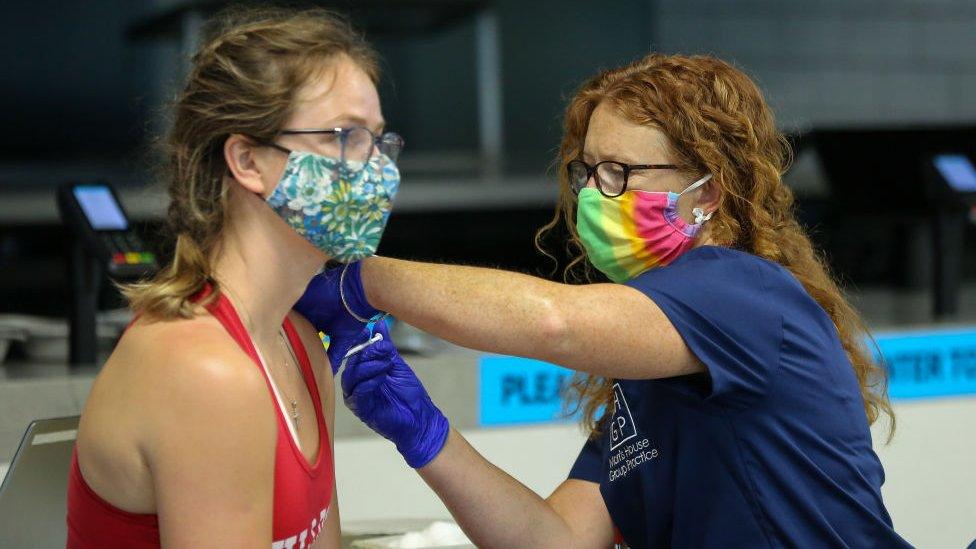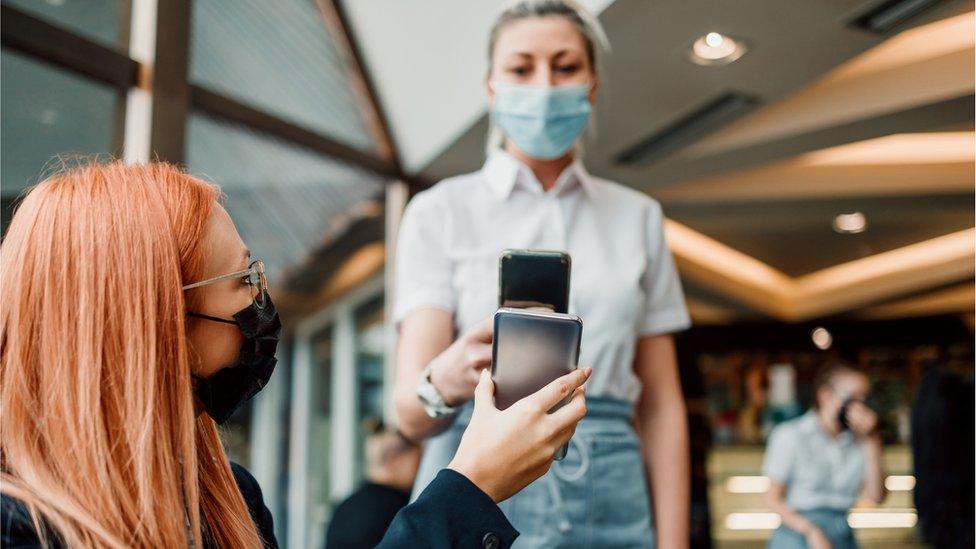Covid-19: Vaccination booster clinics open across NI
- Published
- comments

A series of Covid-19 vaccination clinics have opened to help meet demand for booster doses.
On Monday, the Joint Committee on Vaccination and Immunisation (JCVI) recommended booster jabs be offered to over-18s.
The clinics, at this stage, are offering boosters to the over 50s, as well as first and second doses to anyone eligible of any age.
Northern Ireland has had the lowest uptake of the booster shot in the UK.
Health Minister Robin Swann said the aim was to give boosters to all eligible age groups "as quickly as possible".
He urged the public not to be "put off getting their first, second or booster doses due to concerns or speculation about the Omicron variant".
A number of cases of the new variant have already been detected in both England and Scotland.
The health minister said it was "very likely that vaccination will continue to protect against severe illness from Omicron as it does against other variants of SARS-CoV-2".
"In addition, our vaccines provide very good protection against the Delta variant, which remains the predominant strain in Northern Ireland at this point," he added.
Bookings for the vaccination clinics can be made here, external.
The JCVI also said the minimum gap between the second vaccine dose and booster should be reduced from six to three months.
The experts also said children aged 12-15 should be invited for a second jab.
On Tuesday, the Department of Health reported two further Covid-19-related deaths in Northern Ireland, and 1,585 new cases.

Key points on the expanded booster programme:
If aged over 50
and it has been at least three months since your second vaccine dose, you can now get a booster.
You can get it at a trust vaccination clinic, a participating pharmacy, or wait for your GP to invite you in.
If aged 40 to 49
and it has been six months or more since your second dose, you can get your booster at a trust vaccination clinic.
Eligibility for this age group will be widened in the coming weeks to gradually include those with a gap of three months since their second dose.
If aged 18 to 39
The Department of Health said you will be eligible for a booster when called forward by health authorities. This will be done on a phased basis, in order of descending age groups. People are urged to wait until their age group is called forward.

The new vaccination hubs and clinics will operate alongside the ongoing vaccination work of GPs and local pharmacies.
The pharmacy sector is finalising plans for a special weekend of additional walk-in booster vaccination clinics this Saturday and Sunday.
Trust centres are also providing ongoing first and second doses for all eligible age groups.
Dr Alan Stout, from the British Medical Association, said encouraging people to get their first dose is just as important as the booster jab roll-out.
"It's not because we're anxious that the effect of the vaccine is dipping any quicker," he added.
"It's to make sure that we don't get that dip in the middle of what's going to be a very difficult winter."


Everyone over the age of 18 is being invited to come forward and get a booster jab, but this is a staged process, depending on age and other criteria.
That means you will have to wait your turn to receive the booster vaccine, you can't turn up at a clinic any time.
The advice is to go to the NI Direct website or to your local health trust website where you can find out where you can get the booster jab.
In terms of a fourth dose of the vaccine being offered to those who are immunosuppressed, the aim is to protect them from the virus even further.
Prof Martin McKee, from the London School of Hygiene and Tropical Medicine, said if three doses were to cut the risk of contracting Covid-19 by 93%, then another dose would provide even more protection.
With members of the public still coming forward for their first and second doses of the vaccine, public health messaging is ongoing to encourage as many people as possible to get jabbed.

Patricia Donnelly, head of Northern Ireland's vaccination programme, thanked those who had come forward to help with the vaccination programme over the last year, and asked that they do so once again.
"Providing vaccines for the unvaccinated is still a high priority," she added.
"We're working through children and encouraging anyone not vaccinated to come forward.
"But if you are the eligible age, and you have the right amount of time between your second and booster dose, you can book or walk right in."

The head of Northern Ireland's vaccination programme says there have been a greater uptake of the vaccine in over 18's
The Covid-19 certification system which came into effect on Monday may have also had an impact on vaccine uptake.
"It's hard to know what exactly is working but we have definitely have seen a greater uptake in the over 18s," said Patricia Donnelly.
"The stories we're getting from the vaccination centres, and from GPs and pharmacists, is that a surprising number of older people are only coming forward now that have held back and been frightened up until now."
Ms Donnelly said it was unlikely that the under 40s would be able to get a booster jab before Christmas.
'Remarkable achievement'
More than 3,000,000 Covid vaccinations have been delivered in Northern Ireland in the past year.
Meanwhile, there have been no confirmed cases of the Omicron variant of Covid-19 detected in Northern Ireland, according to the deputy chief medical officer.
Dr Lourda Geoghegan told BBC News NI it was possible that cases could emerge "in the coming days and weeks".
She said there was "some cause for concern" about the new variant compared to other variants "given the amount of mutations or the changes in the genetic make-up of the virus, particularly around the spike protein".
However, studies continue into the transmissibility of Omicron and whether it is a more severe form of the virus, Dr Geoghegan said on BBC's Good Morning Ulster programme.
Her comments follow a warning from Health Minister Robin Swann on Monday that the variant may already be present in Northern Ireland after a number of cases were found in England and Scotland.
Mr Swann said it was "not a time for panic or despair" and it was "very likely that vaccination will continue to protect against severe illness from Omicron as it does against other variants".
Related topics
- Published29 November 2021

- Published2 April

- Published18 November 2021

- Published19 December 2021
